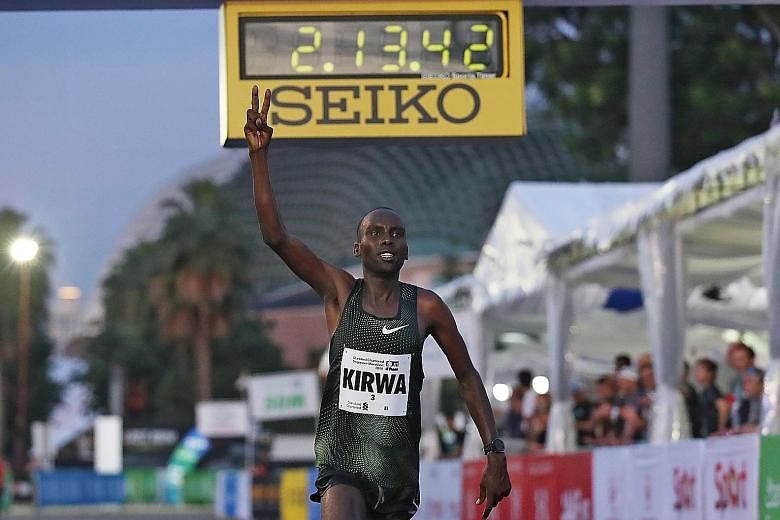A second medal winner at last year's Standard Chartered Singapore Marathon (SCSM) has been banned for failing a drug test.
Kenyan Felix Kiptoo Kirwa, runner-up in the men's elite field, tested positive for strychnine at the Dec 9 race and has been banned for nine months until Nov 14.
The 23-year-old has also been disqualified from his second-placed finish, meeting the same fate as Lim Baoying, the local women's champion who last month was banned for nearly four years after failing a post-race dope test.
Kirwa will also be made to forfeit his US$25,000 (S$34,159) prize money, appearance fees and any other entitlements, and results between Dec 9 and Feb 14, the day he accepted his sanction from the Athletics Integrity Unit (AIU).
Another Kenyan, Andrew Kimtai, who finished third, has been promoted to second. Cosmas Matolo Muteti, also a Kenyan, is now third.
The AIU was established by the International Association of Athletics Federations (IAAF) in 2017 to combat doping in track and field.
According to an AIU press statement issued last Tuesday, Kirwa, who also won the Singapore Marathon in 2016, claimed that he had consumed herbal medicine products - Arthritis Care and Goodcare Arthplus - to treat arthritis.
Both products contain strychnos nuxvomica, which contains strychnine, it added, but strychnine itself is not listed on either product. Strychnine is better known as an ingredient in rat poison. It is on the World Anti-doping Agency (Wada) list because it is a stimulant.
The AIU said that "based on the athlete's explanation and supporting medical evidence", it was "satisfied that the athlete used the herbal medicine products for therapeutic reasons".
It also explained that it had banned him for only nine months, instead of the mandatory two years, because it had taken into account "the athlete's relative age, inexperience and (the fact) that the prohibited substance did not expressly appear on the herbal medicine product labels".
It had concluded that "a search of the ingredients given on the product label of the herbal medicine (Sudh Kuchla/Strychnos nuxvomica) against the Wada 2018 Prohibited List would not have identified a prohibited substance".
The ban is another blow for the Kirwa family.
On May 21, his sister Eunice, who had represented Bahrain and claimed the marathon silver medal at the 2016 Olympics, was provisionally suspended after returning a positive test for the blood-booster erythropoietin (EPO).
Last month, Lim, 37, was banned for three years and nine months by the AIU after testing positive for modafinil following the marathon.
The doctor did not have therapeutic usage exemption for the medicine, which is on the Wada Prohibited List and prescribed to people with sleep disorders to help them stay alert or improve focus.
National marathoner Rachel See, who was second, was later declared the local women's winner.
Yesterday, race organiser Ironman Asia and the Standard Chartered Singapore Marathon said in a statement: "Ironman and the SCSM remain committed to clean sport and each announcement of an anti-doping rule violation serves as an important reminder that all SCSM athletes are subject to the rules of the IAAF, the AIU Anti-Doping Program, and to testing.
"All athletes are responsible for the choices they make when it comes to nutrition and medications taken."


